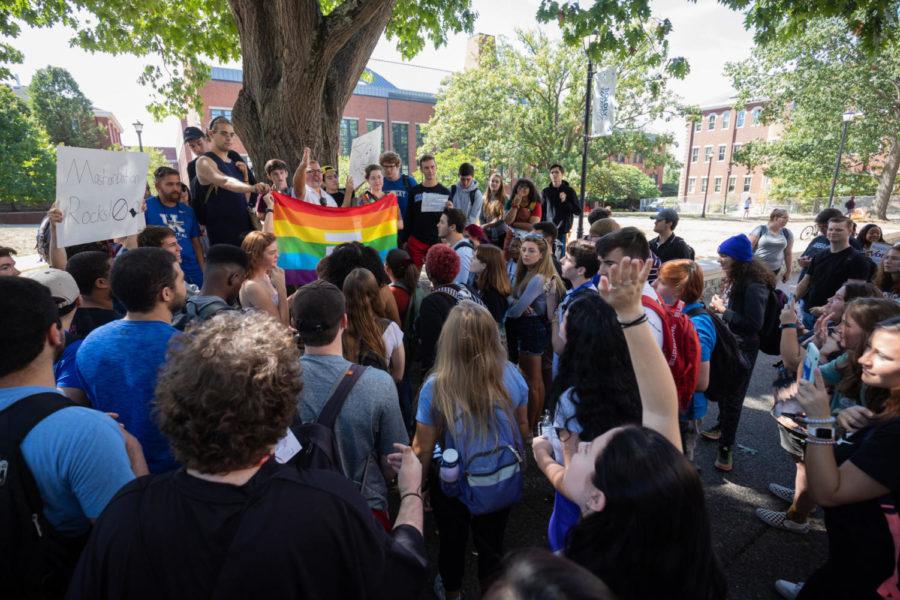Students deserve free speech
A crowd of students gather in protest around a preacher outside of Whitehall classroom building on Tuesday, Sept. 24, 2019, at the University of Kentucky in Lexington, Kentucky. Photo by Michael Clubb | Staff
September 25, 2019
Michael Frazier is an undergraduate student at the University of Kentucky studying Philosophy, Political Science and Economics. Michael is an LGBTQ and First Amendment rights activist. Michael was a primary contributor and citizen lobbyist for the Kentucky Campus Free Speech Act, which was signed into law by the Governor of Kentucky on March 26, 2019.
The cheers, the chants, and an occasional profane request to self-perform coitus —’tis the season for hate preachers on UK’s campus, with their yellow banners proclaiming that sinners will burn in hell. These self-proclaimed preachers profess to be devout Christians, attempting to zealously — albeit theatrically — save the souls of students on college campuses.
Every year, students quickly galvanize in counter-protest to offer a message of inclusivity. The event also ignites a discussion about free speech. This year, as I stood among the preachers, I watched the crowd, including members of faculty posing for a selfie against the backdrop of the demonstration. While listening to the chants, I overheard a few questions about why the university allowed the preachers to be outside a designated free speech zone.
Not too long ago, the University of Kentucky prohibited all expression and counter-expression outside of a tiny area ironically referred to as the “free speech zone.” Primarily employed as a tool to suppress the civil rights movement and the Vietnam War protests, UK’s free speech zone was located between the student center and Barker Hall. Mostly concealed from the public, this space was hardly large enough to hold more than a few people, much less a counter-protest the size we saw on Tuesday.
As an openly gay student and LGBTQ advocate, the free speech zone seemed like a good idea to me, especially to quarantine hateful speech. The reality is, however, that the policies which confined discourse to the designated free speech zone have never been able to quarantine the hate preachers.
When my LGBTQ group was stopped from forming a circle around a hate preacher to sing “Jesus Loves Me,” I noticed there was something fundamentally flawed with the free speech zone: whenever we quarantine any person to a free speech zone, we limit our activism, including our ability to be able to speak out against hate. Hate speech is protected under the First Amendment of the U.S. Constitution. Based on what I witnessed from students on Tuesday, Sept. 24, when preachers out in front of White Hall, we want to be able to use our First Amendment rights to challenge hate speech as well.
Suppressing LGBTQ groups passing out flyers, impeding Free Hug Day, moving pro-life demonstrations, silencing pro-choice counter-protests and, ironically, stopping students from registering other students to vote are just a few examples of the everyday demonstrations that were stopped because they were outside a free speech zone here at UK.
To secure the ability to openly express and, conversely, counter any message, I helped lead over 27 bipartisan and diverse student organizations from across Kentucky to pass in the Kentucky Campus Free Speech Act. The Free Speech Act ensures that the free speech rights of students are protected, specifically protects counter-protests, bans free speech zones, protects academic freedom and makes all generally accessible, open, outdoor areas of campus available for free expression.
Universities, however, have an extensive history of viewing the First Amendment as an inconvenience to their marketing plans, preferring campus to be a bit more plastic. Universities try to conflate and exploit infrequent moments like the hate preacher as the norm, asserting that students are too fragile to handle certain speech, as an excuse to assert that the First Amendment should not go past the schoolhouse gates.
When we ask for speech to be limited to a designated zone within certain times, we allow for something far worse than the hate preachers to creep onto our campus: the tools of censorship and discrimination that can silence us all.
The visit by the hate preacher didn’t create a crisis on campus. On Tuesday, I was proud of my campus community. The chants, the cheers, the rainbow flags, and, yes, even the few profanities proved that students are well-equipped to stand up against hate speech with our own First Amendment rights, which can only be done when free speech is allowed and protected.






























































































































































